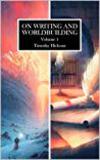
To start with, despite a somewhat overblown feeling title, On Writing and Worldbuilding, Volume I is a solid book. It has piles of examples, a good dash of humor, and is well written enough to fly by.
I do not like the word ‘should’. Or, at least, I do not like how it has been used in books, videos, and lectures that purport to teach people how to write. The term ‘should’ is used often enough that authors might be tricked into thinking there is an objective way to write well. That there is some pantheon of writing deities who have brought forth the Ten Commandments of Writing, and that only the wise and sagelike amongst us can discern their will. Dare you write a book that is pure and unadulterated wish fulfillment? If you write a book that fails to use the three-act structure, curse ye! Doom awaits those that write vampire-romances with one-dimensional characters
It’s funny and there are more than enough hints and examples to give you a few more ideas on how to improve your own writing and worldbuilding. I think my favorite comment in the entire work came right about at the beginning:
An author owes no obligation in their work other than to write the story they wish to read.
I would argue that not even that is an obligation, but it certainly helps. There’s a passion to it you can feel and something I should probably pay a little more attention to in my own works.
On the downside, just about everything in this book comes almost directly from Hickson’s Hello Future Me YouTube channel, specifically the [On writing](https://www.youtube.com/watch?v=YqC7IVKQPbg&list=PL1TLSKocOLTvdl54a6wgNdB8oSm- eZ7h6) playlist. Certainly helpful if you prefer one medium over the other, but I’ve already seen all of his YouTube videos. It was interesting to see them in another form though.
Another interesting comment is that several chapters that deal with magic systems crib heavily from Sanderson’s ‘Three Rules of Magic’.
Sanderson wrote essays on what he calls the ‘Three Rules of Magic’, and the most important one for hard fantasy is the first: “An author’s ability to solve conflict with magic is directly proportional to how well the reader understands said magic.”
It’s certainly good advice, but again, something I’ve seen before. In this case on the [ podcast, hosted by Sanderson among others. But again, different formats and it doesn’t really hurt to listen to them both.
Overall, if you’re interested in writing and worldbuilding, give this a whirl. At they very least, it’s a greatly amusing read and maybe, just maybe, you’ll learn something. ](https://writingexcuses.com/)